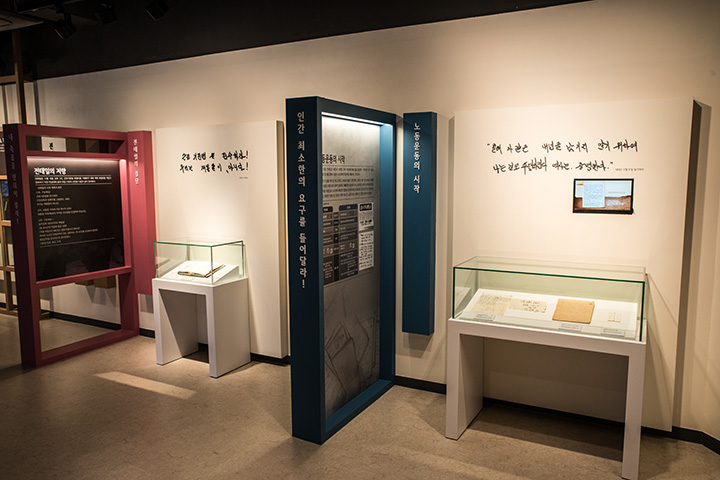
On February 24, 1967, Chun Tae-il became a tailor. However, there was a limit to how much he could help the weak and young female workers. The fundamental problems of poor working conditions, long hours, and low wages could not be easily resolved.
In the summer of 1967, Tae-il learned about the “Labor Standards Act” from his father and devoted himself to studying it. Article 42 of the Labor Standards Act says, “Working hours shall not exceed 8 hours per day, 48 hours per week, and a maximum of 60 hours, excluding break time.” Article 45 mentions that, “The employer shall give the worker at least one paid holiday per week on average.” In addition, the law prohibits night shifts for workers under the age of 18 (Article 56) and harmful work (Article 43).
Although these regulations was not observed at the Pyeonghwa Market, the shop owners were not punished.
Around June 1969, Tae-il launched the Babo-hoe, an organization of tailors, which started with about 10 members. Tae-il, who chaired the Babo-hoe, created and distributed a questionnaire to investigate the actual condition of the garment sweatshops in Pyeonghwa Market and based on it, submitted a petition to the Seoul City Hall and government labor office. However, the activities of the Babo-hoe did not last long due to lack of funds and poor performance.
In November 1969, Chun Tae-il wrote a letter appealing to President Park Chung-hee about the reality of the Pyeonghwa Market.
In January 1970, he decided to create a model company and prepare a plan containing a business management policy in compliance with the Labor Standards Act. To raise money for the business, he was courageous enough to send a donation letter to a nationwide daily newspaper, but ultimately, he could not realize his dream because he was unable to raise the funds.
In September 1970, Samdong-hoe (an association of garment cutters) was established, the fact-finding investigation began again, and the struggle resumed by submitting petitions to Dongyang Broadcasting, City Hall, and Labor Administration Office. For the first time, this initiative was reported in a social section of the Kyunghyang Shinmun under the title, “Working 16 hours a day in small rooms.”
He continued to hold meetings and protests against officials from the Labor Administration Office for a while, but when the parliamentary inspection of the government offices ended that year, his feelings of being deceived and frustration grew. He prepared for a demonstration by burning a copy of the Labor Standards Act.
On November 13, 1970, Chun Tae-il protested with a self-immolation act, shouting “Comply with the Labor Standards Act” and “We are not machines,” when a demonstration to burn the copy of a book containing the Labor Standards Act was stopped by the police.
In the summer of 1967, Tae-il learned about the “Labor Standards Act” from his father and devoted himself to studying it. Article 42 of the Labor Standards Act says, “Working hours shall not exceed 8 hours per day, 48 hours per week, and a maximum of 60 hours, excluding break time.” Article 45 mentions that, “The employer shall give the worker at least one paid holiday per week on average.” In addition, the law prohibits night shifts for workers under the age of 18 (Article 56) and harmful work (Article 43).
Although these regulations was not observed at the Pyeonghwa Market, the shop owners were not punished.
Around June 1969, Tae-il launched the Babo-hoe, an organization of tailors, which started with about 10 members. Tae-il, who chaired the Babo-hoe, created and distributed a questionnaire to investigate the actual condition of the garment sweatshops in Pyeonghwa Market and based on it, submitted a petition to the Seoul City Hall and government labor office. However, the activities of the Babo-hoe did not last long due to lack of funds and poor performance.
In November 1969, Chun Tae-il wrote a letter appealing to President Park Chung-hee about the reality of the Pyeonghwa Market.
In January 1970, he decided to create a model company and prepare a plan containing a business management policy in compliance with the Labor Standards Act. To raise money for the business, he was courageous enough to send a donation letter to a nationwide daily newspaper, but ultimately, he could not realize his dream because he was unable to raise the funds.
In September 1970, Samdong-hoe (an association of garment cutters) was established, the fact-finding investigation began again, and the struggle resumed by submitting petitions to Dongyang Broadcasting, City Hall, and Labor Administration Office. For the first time, this initiative was reported in a social section of the Kyunghyang Shinmun under the title, “Working 16 hours a day in small rooms.”
He continued to hold meetings and protests against officials from the Labor Administration Office for a while, but when the parliamentary inspection of the government offices ended that year, his feelings of being deceived and frustration grew. He prepared for a demonstration by burning a copy of the Labor Standards Act.
On November 13, 1970, Chun Tae-il protested with a self-immolation act, shouting “Comply with the Labor Standards Act” and “We are not machines,” when a demonstration to burn the copy of a book containing the Labor Standards Act was stopped by the police.
Relevant exhibits
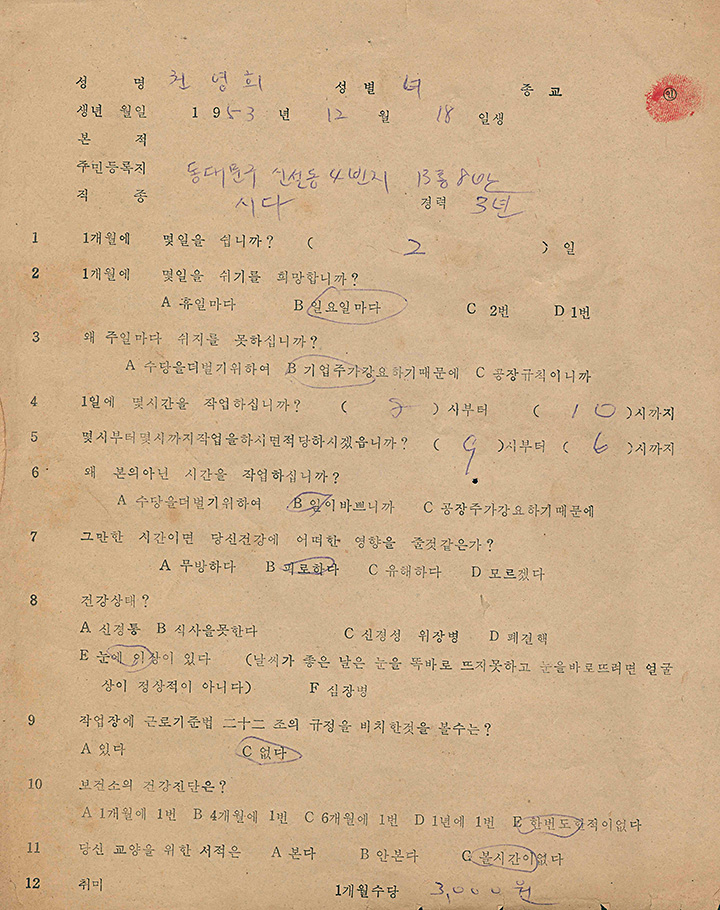
Pyeonghwa Market Labor Conditions Survey, 1970, Chun Tae-il Foundation
Babo-hoe created a questionnaire to investigate the labor situation of workers at Pyeonghwa Market. Workers were asked to indicate their working hours, occupational diseases, holiday work, and wages in the questionnaire. Based on this survey, complaints were submitted to the Ministry of Labor and the media.
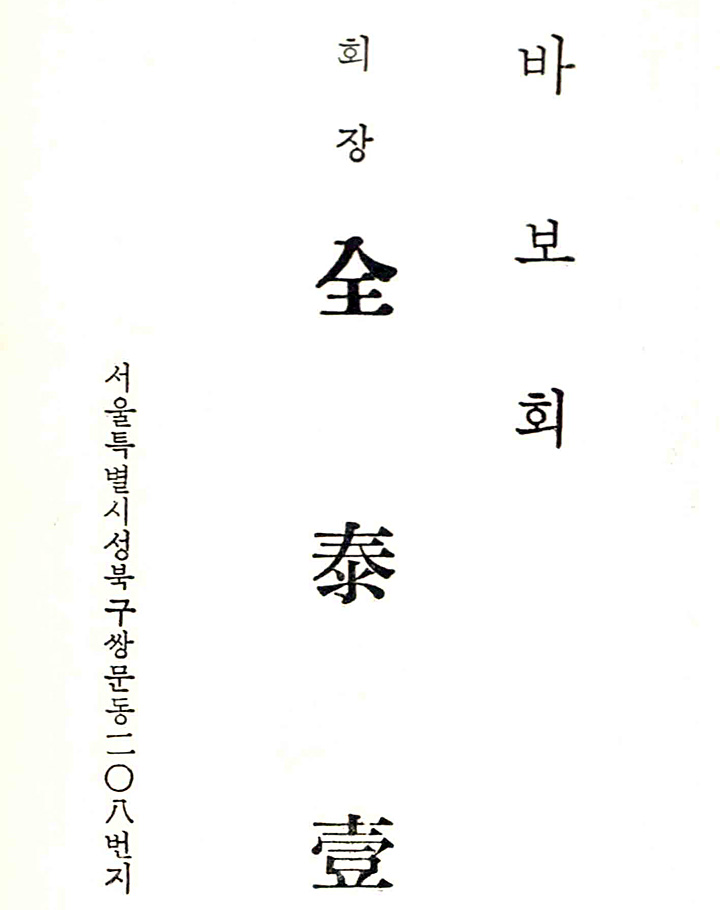
Chun Tae-il’s Business Card as the President of Babo-hoe, 1969
Around June 1969, Tae-il gathered about 10 tailors and set up an organization called Babo-hoe to improve the working environment. The name Babo-hoe was decided as a lament to the reality that despite the working conditions being stipulated by law, workers were abused and exploited by employers.
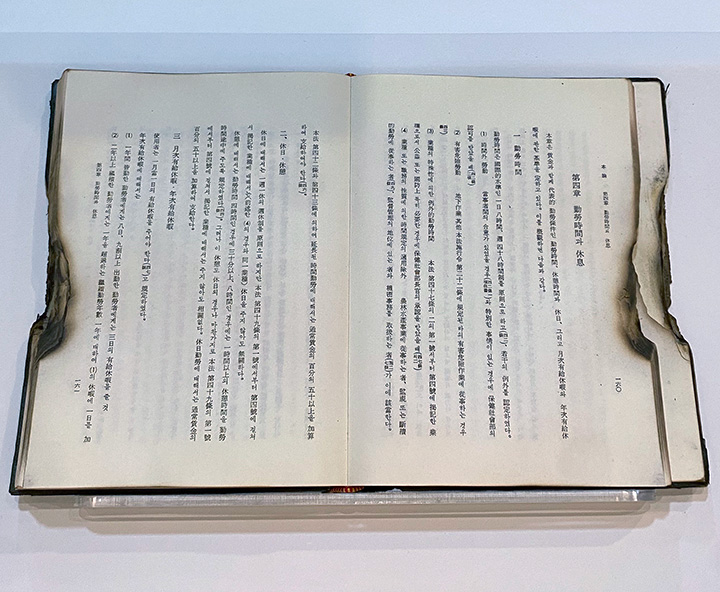
Explanation of the Labor Standards Act Written by Shim Tae-sik, 1963, Replica
Tae-il learned about the existence of the Labor Standards Act from his father and always carried a book on it to study. Even at the time of the self-immolation protest, it is said that he was holding a book on the Labor Standards Act in his hands. This book was published in 1963 and is similar to the one that Tae-il owned. Through the replica of the burnt book on display, one can feel the emotions of Chun Tae-il, who must have been frustrated and distressed after learning that the Labor Standards Act, which was similar to a ray of light, was rather futile.
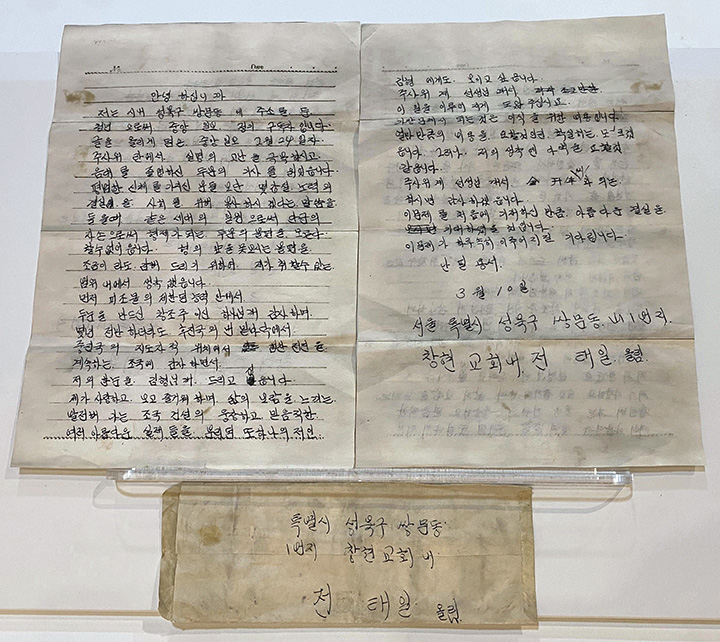
Letter to Korea JoongAng Daily, 1970
Chun Tae-il was contemplating raising funds for the establishment of a model company, “Tae-il Clothing,” when he encountered the story of a blind music student in the social section of the Korea JoongAng Daily. Tae-il wrote a letter stating that he would donate one eye. However, this letter was never delivered and was returned. It appears that Tae-il’s willingness to establish a model company was strong enough for him to decide to donate his eyes.

